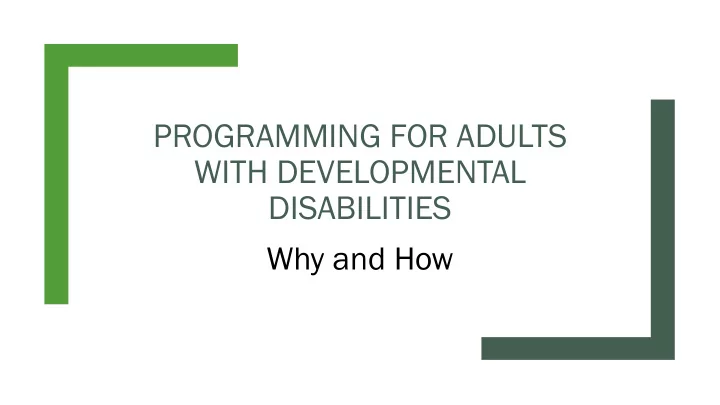

PROGRAMMING FOR ADULTS WITH DEVELOPMENTAL DISABILITIES Why and How
Barriers to and benefits of programming for adults with developmental disabilities Creating a culture of Inclusion A sampling of programming ideas Agenda Best practices More about our book Contact us
SECTION ONE: BARRIERS AND BENEFITS
What are Developmental Disabilities? Umbrella Term: • Manifest before the age of 22 • Are lifelong • Characterized by functional limitations • Include Intellectual Disabilities, autism and others
Library Barriers to Programming • Low attendance numbers • Concerns about extra work • Lack of ties to the community • Lack of Expertise
Societal and Attitudinal Barriers • Implicit Bias • Medical model of disability • Low expectations of people with DD
It’s the Law: Th The DD DD Ac Act The D Developmental D Disabilities A Assistance and B Bill o of R Rights A Act o of 2 2000
Breaking Down Barriers “We are becoming champions for accessibility and we become more aware.” Renee Grassi, Dakota Library in MN
We all benefit “…do not underestimate the ability of people with intellectual disabilities’ capacity to learn and to also teach you something.” --staff Contra Costa County Library (CA)
SECTION TWO: CREATING A CULTURE OF INCLUSION
Universal Design for Learning
Multiple Means of Representation and Engagement
Multiple Means of Representation and Engagement
Sensory Tools: Sensory Seeking ■ Fidgets ■ Resistance ■ Movement
MULTIPLE INTELLIGENCES THEORY PROVIDES A CHECKLIST
Sensory Tools: Sensory Avoiding ■ Noise cancelling headphones ■ Sunglasses, baseball caps ■ Quiet space
Sensory Tools: Structure ■ If multiple sessions, use same structure each time ■ Announce structure at the beginning and reinforce throughout ■ Make implied structure explicit
VISUALS
Administrative Support
SECTION THREE: SOME PROGRAM IDEAS
Library Tours ■ Be interactive and hands-on ■ Be aware of how you communicate ■ Incorporate visuals, predictability ■ Show where to go with questions ■ Focus on adult areas and services ■ Cover library rules and behavioral expectations
SENSORY FRIENDLY MOVIES
Food and Cooking Programs • Single food programs • Cooking demos • Cooking lessons • Combine cooking and gardening Photo from Athens Regional Library System used with permission
Read Along Programs • Next Chapter Book • Book and Craft Club Program • Book and Movie Club • Design Your Own
Virtual Programming ■ Virtual phone book clubs ■ Virtual autism/sensory- friendly concerts – Read-alouds with discussion ■ On-line Craft programs ■ One to one phone – Fidgets – Reference and check- – Mirror writing ins – Technology and virtual resource help – Poetry readings
Make Sure Existing Programs Are Inclusive
SECTION FOUR: BEST PRACTICES
Best Practices: Planning ■ Involve Self-Advocates ■ Consider both chronological and developmental age ■ Partner with community agencies ■ Partner with other library staff ■ Train staff
Best Practices: Implementation ■ Schedule at best times for attendees ■ Use volunteers ■ Communicate effectively ■ Offer choices ■ Let the participants lead
SECTION FIVE: MORE ABOUT OUR BOOK
PROGRAM CATEGORIES : • Library and Literature Programs • Arts and Crafts Programs • Performing Arts • Gaming • Adulting/Life Skills Programs • Career/Employment Programs • Virtual Programs
Other Topics Covered: • Planning • Correct terminology • Marketing • Funding your programs • Extensive resources
LIBRARIES ARE FOR EVERYONE
Contact Us Carrie Banks carriebankspbl@gmail.com 917.751.4890 Barbara Klipper b.klipper@icloud.com 203.253-5919
L e t’ s Di s c u s s ! May 27, 11 am PT/1:00 pm CT/2:00 pm ET Facilitated by Mary Kelly, Statewide Coordinator, Autism Program of Illinois Limited Space of 20 participants For an invite and access information: ■ Email your name, organization, state and why you would like to be part of the discussion to lisa@infopeople.org by May 23. An invitation with access information will be sent by May 25 th
Recommend
More recommend